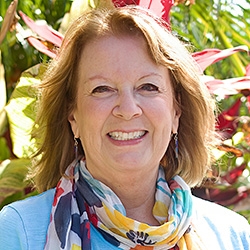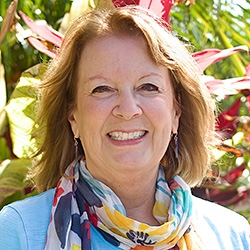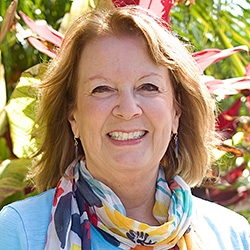

Search Results: feelings
-
Do you ever think you have the perfect answer for someone who is struggling? Eric offers a tip on how to approach situations like this.
-
In this book excerpt, Kathleen and Jared offer a path to reach deeper clarity, distinguishing between revealing ourselves and projection.
-
Inbal offers parents and anyone with children in their life a lucid discussion of the important role self-empathy plays in creating healthy, supportive relationships.
-
Puzzling about needs and feelings? Check out this excerpt from Dian Killian's course, Embracing the Body: Somatic Self Empathy, where she leads participants through an exercise that demonstrates how our physical sensations connect us to our feelings and needs.
-
Anger is a sign that you're resisting what's happening because you perceive an overwhelming threat, not trusting yourself to handle what's happening directly. Vulnerable feelings under anger are usually fear, hurt, or grief. Experiencing and expressing these feelings and connecting them to your needs, gives you access to more skill, insight, compassion, and wisdom. Read on for 3 questions to ask yourself when angry.
-
Want things to change in your community, but feel frustrated or don’t know what to do? Miki’s intriguing overview of how to apply the principles of NVC to social change movements may have the exact blend of inspiration and ideas you’re seeking!
-
For many, spending time with relatives over the holidays may be challenging. In addition to the love and care we may feel, family gatherings can bring up old hurts or expose painful differences. How many family meals have been marred by tense silence or devolved into harsh argument?
-
Do you sometimes feel overwhelmed – or locked into passivity? This course offers you a way out. Learn to change the way you perceive leadership, and you’ll help yourself respond more powerfully and proactively every day of your life – wherever you are – and whomever you’re with!
-
CNVC Certified Trainer Lore Baur asks: "Have you ever seen something happen that made you feel uncomfortable and you didn't know what to do?" That's the "bystander effect:" a well-researched and commonly experienced phenomenon. Training can help you overcome it, enabling you to discern what to do and how to support others in ways that reduce trauma and increase safety.
-
Trainer Tip: We feel our freedom when we are willing to look at others’ needs and our own, evaluate all of them and work toward valuing everyone’s needs. Take the time to demonstrate that you value everyone’s needs as much as your own today.
-
Trainer Tip: Even when you hit deep emotional bottoms, instead of deciding whether something is good or bad, get clear on how you feel about it and what needs it will or will not meet. Let the Universe do the rest. Then take action to resolve any situations that are not enjoyable to you.
-
Trainer Tip: Do you sometimes feel lonely and disconnected from others? If so, look at how you may be participating in supporting that outcome and what you can do differently. For instance, if you want support or connection - but prioritize looking composed no matter how sad, hurt or angry you feel, you may shield yourself from authentically and vulnerably asking those things. Instead, make those requests.
-
Is there someone you wish was more willing? Try guessing what obstacles they might be struggling with. And allow yourself to feel your grief. As you grapple with your own desire for someone to find their willingness, its essential to recognize that this is about you and your needs. You can also express your needs honestly, make requests for how to collaborate, and be responsive to what they want. Read on for more on this, plus four common ways someone’s willingness might be blocked.
-
It's normal for us to keep something inside, avoiding sharing it with someone else as the risk may feel too high. Maybe they will reject me, or be offended and not speak to me again? It can be difficult to know when to share your truth and when to keep it inside. In this episode we layout some useful strategies that will help you speak your truth, while still keeping the connection.
-
Ask the Trainer: Finding ease and authenticity when writing to someone with cancer.
-
Want things to change in your community, but feel frustrated or don’t know what to do? Miki’s intriguing overview of how to apply the principles of NVC to social change movements may have the exact blend of inspiration and ideas you’re seeking!
-
Ever have a hard time saying "no" to someone, or feel obligated to say yes? Here's an exercise that can help you notice where you are placing yourself as someone who "has to" say yes; the needs in the other person making the request; what you want to say "yes" to (regarding your needs and theirs) by saying "no"; what prevents you from saying "yes"; plus your request and how you might express it.
-
Differentiation means you can access both autonomy and intimacy in relationships. When you're unafraid to lose yourself or be controlled, you can feel deeply connected and affected, while standing strong in yourself. Differentiation also means ability to tolerate disharmony and differences, self-soothe, offer compassion, and set boundaries. Here, we'll focus on setting boundaries with monitoring eye contact and physical interaction, and interrupt our "helping".
-
Is it tough to see a loved one go through hardship? May you have tension building up inside and draw a rigid boundary, or feel the urgency to swoop in and try to “rescue” them with advice, consoling, cheering up, analyzing, or explaining? Instead, relax your body. Invite your emotions to flow with acceptance. Notice inner peace and expansion. See this person as someone on a journey to awakening with all its painful and joyful twists and turns.
-
You value generosity and you often give easily from the heart. There are those times, however, when you get snagged by a sense of obligation. You feel tense and resentful. You don't want to continue with this attitude, but how can you reconnect with the desire to give from the heart? Let’s touch on three essential elements that support giving from the heart: choice, mourning, and acceptance.

Quick Links
Subscription Preferences
Stay In Touch!
Looking for ways to keep up with NVC Academy news, get special offers, free resources, or words of inspiration? Here are five ways to stay engaged:



















